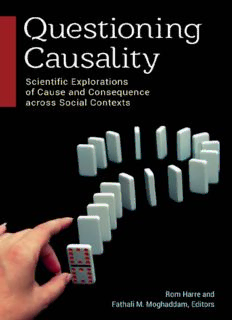
Questioning Causality: Scientific Explorations of Cause and Consequence across Social Contexts PDF
Preview Questioning Causality: Scientific Explorations of Cause and Consequence across Social Contexts
Questioning Causality Questioning Causality fi Scienti c Explorations of Cause and Consequence across Social Contexts Rom Harré and Fathali M. Moghaddam, Editors Copyright©2016byRomHarréandFathaliM.Moghaddam,Editors Allrightsreserved.Nopartofthispublicationmaybereproduced,storedinaretrieval system,ortransmitted,inanyformorbyanymeans,electronic,mechanical,photocopying, recording,orotherwise,exceptfortheinclusionofbriefquotationsinareview,without priorpermissioninwritingfromthepublisher. LibraryofCongressCataloging-in-PublicationData Questioningcausality:scientificexplorationsofcauseandconsequenceacrosssocial contexts/RomHarréandFathaliM.Moghaddam,editors. pagescm Includesbibliographicalreferencesandindex. ISBN978–1–4408–3178–2(hardback)—ISBN978–1–4408–3179–9(ebook) 1. Socialsciences–Research.2. Research.3. Causation. I.Moghaddam,FathaliM.,editor. II.Harré,Rom,editor. H62.Q47 2016 300.72—dc23 2015031330 ISBN:978–1–4408–3178–2 EISBN:978–1–4408–3179–9 20 19 18 17 16 1 2 3 4 5 ThisbookisalsoavailableontheWorldWideWebasaneBook. Visitwww.abc-clio.comfordetails. Praeger AnImprintofABC-CLIO,LLC ABC-CLIO,LLC 130CremonaDrive,P.O.Box1911 SantaBarbara,California93116-1911 Thisbookisprintedonacid-freepaper ManufacturedintheUnitedStatesofAmerica Contents Acknowledgments ix Introduction xi RomHarréandFathaliM.Moghaddam PARTONE:THECONCEPTSOFCAUSATIONAS DEVELOPEDBYPHILOSOPHERS 1. TheDiscourseFrame 3 RomHarré 2. TheTemporalFrame 21 RomHarré 3. TheExplanationFrame 33 RomHarré PARTTWO:CAUSALCONCEPTSAND RESEARCHMETHODS 4. CausationinIntroductoryPsychologyTexts 53 RavenDunstanandFathaliM.Moghaddam Editors’Commentary 64 5. RerumCognoscereCausas:DependentandIndependent VariablesinPsychology 67 AdrianFurnham Editors’Commentary 81 vi Contents 6. OntheConceptof“Effects”inContemporaryPsychological Experimentation:ACaseStudyintheNeedforConceptual ClarityandDiscursivePrecision 83 JamesT.Lamiell Editors’Commentary 101 7. LegislatingCausalLogic:ScientificallyBasedEducational ResearchintheUnitedStates 103 NaomiLeeandAlissaBlair Editors’Commentary 117 PARTTHREE:CAUSALCONCEPTSAND LINGUISTICTOPICS 8. TriggersandTheirConsequencesforLanguageAcquisition 121 DavidW.Lightfoot Editors’Commentary 136 9. CausesofLanguageDeath 139 PeterMühlhäusler Editors’Commentary 153 10. APictureIsWorthaThousandWords:OnCauses,Reasons, andImages 157 JensBrockmeier PARTFOUR:CAUSALCONCEPTSAND MEDICALCONTEXTS 11. TheNotionofCauseinBiomedicine 169 JohnGrimleyEvans Editors’Commentary 183 12. CausesandConsequences:PainResearchandthePlaceboEffect 185 JohnC.LefebvreandJamesT.Bednar Editors’Commentary 204 13. QuestioningCausationinMentalHealth 205 PaulSteinberg Editors’Commentary 218 14. UnderstandingthePersonwithAlzheimer’sDisease fromaCauses-and-ConsequencesPerspective 221 KatedeMedeirosandStevenR.Sabat Editors’Commentary 234 Contents vii PARTFIVE:CAUSALCONCEPTSAND COLLECTIVEBEHAVIOR 15. CausalityandProtractedViolentConflicts:TheCase ofInternallyDisplacedPersons 239 DanielRothbartandSudhaG.Rajput Editors’Commentary 256 16. ThisCausesConflict!OntheRisksofEstablishingCausalities throughConflictAnalysisandtheConsequencesofImplementing ThoseLogicsinConflictResolutionStrategies 259 TobiasGreiffandJacquieL.Greiff Editors’Commentary 273 17. CausalityintheStudyofCollectiveAction andPoliticalBehavior 277 WinnifredR.Louis,StephenT.LaMacchia,CatherineE.Amiot, EmmaF.Thomas,LedaM.Blackwood,KennethI.Mavor,and AlexanderK.Saeri Editors’Commentary 303 18. AssumedCausesofCollectiveExcellence 305 KellyComolliandFathaliM.Moghaddam Editors’Commentary 311 PARTSIX:CAUSALCONCEPTSAND LEGALPROCEEDINGS 19. CauseandConsequenceintheLaw 315 WilliamC.Bryson Editors’Commentary 340 20. NoBadDeedGoesUnrewarded:Cause,Consequence,and DevianceinEmergingTechnologicalRegimes 343 RodrigoNieto-Gómez Editors’Commentary 361 PARTSEVEN:CAUSALCONCEPTSAND THEOLOGICALANDPOETRYSTUDIES 21. TheologicalStudies 365 MargaretM.Yee Editors’Commentary 380 viii Contents 22. CausalityandthePoetryofWitness 383 DuncanWu Editors’Commentary 387 Epilogue 391 RomHarréandFathaliM.Moghaddam NameIndex 397 SubjectIndex 407 AbouttheEditorsandContributors 417 Acknowledgments Weareindebtedtomanycolleaguesandstudentsatanumberofuniversities, but want to particularly thank Ms. Nancy Swartz, Ms. Molly McGeady, Mr. Nazir Harb Michel (a.k.a., “be-Nazir”), and the Psychology Faculty at GeorgetownUniversity.
Description: